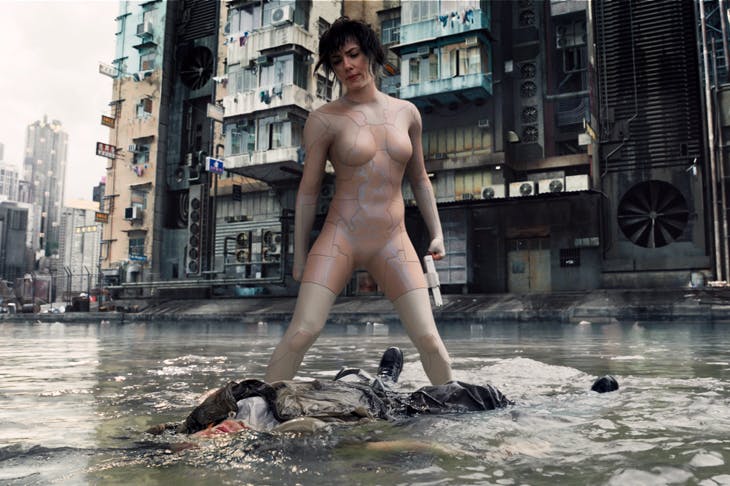Ghost in the Shell is the Hollywood live-action remake of the 1995 Japanese anime of the same name and it’s set at a time in the future when, it would appear, the world is populated by blandly one-dimensional characters. Evil is perpetrated by our old friend, Corporate Evil Man — yes, still — and everyone communicates via dialogue so stilted and ham-fisted it makes you die inside a little. That said, at the media screening I attended we were all given a free bag of high-end crisps, so it wasn’t two hours totally wasted. (I do really like crisps, high-end or otherwise.)
The film stars Scarlett Johansson, who looked liked being an interesting actress for a while but these days? Not so much. She plays Major and here, I suppose, I should note that her casting led to a furious backlash of the ‘whitewash!’ variety as fans felt the role should have gone to an Asian actress, which is a bit strange, as the character in the animation has large, round blue eyes and also the Asian market remakes Hollywood films all the time. Pick your battles, I would say, although probably not to anyone who takes their science fiction seriously, as they are usually quite mad. Also, I’d have to go up to their bedroom, unless they could somehow be convinced to come down.
Major is part-human, part-machine. She was saved from a terrible crash, or so she’s been told, and while her brain (ghost) survived, her body is now cyber (shell). Sorry to spell out the ‘ghost’ and the ‘shell’, as if you are dimwits, but as the film itself keeps spelling it out, as if we are dimwits, it’s possibly best you get used to being treated as a dimwit right now. Major is one of a kind, or so she’s also been told, and works for Section 9, which, as far as I could gather — I was often lost — thwarts hackers and cyber criminals and, goddamn it, someone is out there taking over people’s brains. The bugger.
Fair play, the film is often visually beautiful, and inventive. It opens stunningly, with Major being reborn as a robot, and the hologrammed cityscapes are weirdly compelling, but this never builds a world. There are never any citizens in the cityscapes, for example. Where do they shop? What do they eat? Has Kettle Chips seen off Tyrrells (or vice versa)? Can you still get Walkers? And if everyone is now 73 per cent cyber-enhanced, how is that working out? That’s what I wanted to know.
But instead we are exclusively concerned with Major and the other main players, as bland and one-dimensional as they are. So it’s her sidekick (Pilou Asbaek), the doctor who rebuilt her (Juliette Binoche, looking sheepish), the head of Section 9 (Takeshi Kitano, also looking sheepish), a cyborg gone rogue (Michael Pitt) and Corporate Evil Man, whose identity I cannot reveal, but if you don’t guess it within the first five minutes, then you are truly a dimwit, alas.
The original, directed by Mamoru Oshii — and based on the manga series by Masamune Shirow — was prescient, as it was conceived when the internet was still dial-up and went ‘chhhskkxxttsshzzqkch’ yet it asked us to imagine a time when we might all be technologically connected, and what this might mean for our selves, our identity, our humanity. All this should be played out through Major, who is not satisfied when told she’s one of a kind — ‘You don’t know how alone that makes me feel,’ she says, as I died inside a little — and who is also not satisfied when Dr Sheepish Binoche spells everything out yet further: ‘Your mind, your ghost, your soul are still there.’ (Yup, died again.)
Major goes in search of her true identity but there is no emotional, moral or philosophical complexity as she only seems able to relate to the world in one way, and it’s not through sitting down and saying: ‘Right, Cartesian dualism? How do we feel about that?’ Her way is via combat. And blowing stuff up. So it’s combat, combat, combat and blowing stuff up, over and over and over again. That’s all this film is, in effect. I don’t know how this role was sold to Ms Johansson, but if she was asked if she’d like to run around with a big gun while looking very worried, that covers it, pretty much. I should also probably add that none of this is offset by any levity at all. There aren’t even any of those lame jokes of the Marvel kind. Still, I did get some high-end crisps out of it and… no, that was it.
Got something to add? Join the discussion and comment below.
Get 10 issues for just $10
Subscribe to The Spectator Australia today for the next 10 magazine issues, plus full online access, for just $10.
You might disagree with half of it, but you’ll enjoy reading all of it. Try your first month for free, then just $2 a week for the remainder of your first year.














Comments
Don't miss out
Join the conversation with other Spectator Australia readers. Subscribe to leave a comment.
SUBSCRIBEAlready a subscriber? Log in